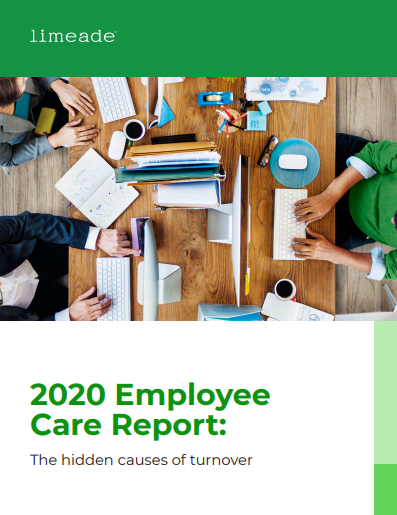2020 Employee Care Report – Limeade
The Limeade’s “2020 Employee Care Report: The hidden cases of turnover” studies the levels of care in the workplace and explores the main issues that affected employee turnover. The report gathered data from more than 1,000 full-time employees in the US.
Some main findings from this research include:
- Merely one-third of survey respondents believed their organizations cared about them as individuals
- 30% of professionals have changed jobs due to the lack of care from their employers; 25% decided to quit when they weren’t treated with dignity and 20% of them left due to the lack of well-being support.
- Nearly 40% of employees claimed they have been asked to quit job together by one of their colleagues and more than half of burned-out employees had this same experience.
- Among burnt-out employees, more than 50% of them had sleeping disorder, one-third of them had low socializing interests and more than one-fourth of them drank more alcohol than normal.
- More than 70% of professionals claimed to have been in burned-out state at work and nearly half of them admitted having resentment towards their organisation quite often.
- Among different generation groups, Gen Z is most likely to search for a new job when they are experiencing burn out at work when Baby Boomers are least likely to do so in the same situation. Similarly, when in burned-out state, Gen Z employees are most likely to change job when Baby Boomers are least likely to do so. However, there is a higher chance of burned-out employees to search for jobs than actually leave the job due to burnout.
- Since the #Metoo movement, more than half of surveyed professionals have recognized their employers’ efforts to improve inclusion in the workplace.
- One-third of employees claimed to have received improper comments about some of their character features. However, only 70% of them reported the incident and among this group, nearly half of them were not happy with the way their employers resolved the issue.
- Even though male and female professionals have similar chance of encountering inappropriate remarks, it’s more likely for male professionals to be satisfied with the resolving outcomes than female professionals.
- Most employees believed their organizations have made efforts to improve inclusion in the workplace. However, more than half of them still left their jobs due to the lack of inclusion.
- Only half of professionals agreed that their employers’ D&I attempts are genuine.
Full report here.
